Palestine
LIKE MANY Palestinians forced from their homes during the 1948 war, relatives of Jordan’s Sen. Haifa Najjar carried the keys to their Palestinian homes with them as they fled. These keys, passed down through generations, are powerful symbols of Palestinian ties to the land that international law considers theirs—even as their hope for return wanes.
As a Christian appointed by King Abdullah II to Jordan’s upper house of Parliament, Najjar is active in the education, environment, cultural, and legal sectors of the government. She is also superintendent of the Anglican-run Ahliyyah School for Girls and Bishop’s School for Boys in Amman, Jordan.
Within the mix of the 500,000 Palestinians who relocated to Jordan because of the Israeli War of Independence—or Nakba, “the catastrophe,” depending on who you ask—was a vocal minority of Palestinian Christians who joined their ranks with the existing Jordanian Christian community. Prior to 1948, Christians accounted for nearly 20 percent of the population of what is now Israel/Palestine. Today that figure is less than 2 percent. Even more dramatic are declines in the West Bank cities of Ramallah and Bethlehem. Christian populations are nearly extinct in these locations compared to their respective majorities of 90 and 80 percent prior to 1948.*
“They moved not as immigrants; they were initially thinking it was a temporary thing,” says Father Nabil Haddad of the Melkite Catholic Church in Amman. “It is similar to what Syrians are thinking right now when crossing the barbed wire, not the checkpoints, between south Syria and north Jordan.”

Mr. President, just like the many other visitors that we receive here in this land, we would do our best to overwhelm you with our cultural hospitality and our traditions. I would seize this opportunity to not only welcome you to visit Bethlehem, but also to welcome all U.S. citizens to visit my small city.
I invite you, Mr. President, to be in my city within the nation that has a dream of liberty — a dream that goes in rhythm with all nations’ right of self-determination. We have embraced, as other nations, our pursuit of democracy, human development, and security. We have tumbled through our pursuits and have made mistakes, and because like all humans, as part of our human nature, we slip. We have built, learned, developed, and made our existence known to all nations.
Mr. President, I hope that in your visit you would not only enjoy the blessings of the Holy Land, but be encouraged to return and experience this city to its fullest. After you finish your presidency you will be able to visit without a big security escort and you will enjoy wandering the old streets and spending time in the old city of Bethlehem when you come back with your family.

President Barack Obama is planning to visit Bethlehem and the Church of the Nativity as part of his visit to Palestine/Israel. The Church of the Nativity, of course, is not the only thing to see in Bethlehem. I suggest that as the president enters the town, from Jerusalem I presume, that he takes a look to his right, and he will see the separation wall. It is hard to miss. It is that ugly concrete structure that gives you the impression that you are inside a big prison. I am sure the president will notice how the wall is killing life in Bethlehem, cutting deep into our neighborhoods.
As he continues on his way through the main street, I suggest he pays attention to his right, to the Azza Refugee Camp. I hope it reminds him of the misery of more than 5 million Palestinian refugees today, who are still waiting in hope for a just resolution to their suffering.
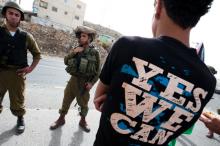
President Barack Obama will be visiting Israel and Palestine in March. I call on you to write to Obama and tell him that if he is coming to engage Israelis and Palestinians in talks that will lead to a just peace, he is then welcome. Otherwise tell Obama to stay home.
Tell Obama that the world will be watching his upcoming visit and people all over our planet will look to his visit with hope and expectation. Tell him not to disappoint humanity by carrying on U.S. politics in the Middle East as usual.
Tell Obama when he visits us here to stand by the values that he reiterates in almost every speech: freedom, independence, equality, and justice for all.
For those who are students of Africa, the Caprivi Strip of Northern Namibia brings memories of the awful border wars and independence struggles of the 1970s and 80s. Perhaps the lessons apply to Israel and Palestine.
Ironically, one of the last and longest, most peaceful and unpolluted rivers in the world is the Okavango. It is the border between Namibia and Angola where still today a long stretch of the north bank Angolan farmland is mine infested. Large breem and tiger fish jump, and magnificent fish eagles take flight from trees on the Namibian bank and wing to large dead trees in Angola where hippo provide background music with loud braying. The behemoths make their way back and forth and often spend the early evening hours lounging on the beach in front of the main buildings of the River Dance Lodge near Divindu on the southern shore.
This gently lapping, wide, drinkable stream — that creates in nearby Botswana the amazing Okavango Delta — is bordered by Angola, Namibia, and Botswana. The crystal clear ribbon of nearly 500 miles of uninterrupted resource runs just a few yards under my feet a quarter of a mile across from where the Angolan fields and forests were the hiding place for Jonas Savembi before he was killed in 2002. His South African- and American-supported troops were routed by Jose Eduardo Dos Santos, the socialist leader of UNITA and president since 1979. We can see homes there that have been vacant since the war because local farmers fled the fighting. Kavanaga tribal tradition requires people to not dwell in places where violent deaths have occurred. Ethnic tribal relations are still tense between the Portuguese-speaking Angolans and the English/German-speaking Namibians, even though they are from the same ethnic group. The horrific memories of vicious cross-river raids and shelling persist.
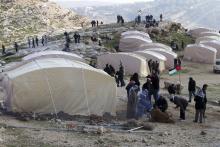
Last week, while most of Israel was focused on increasingly extreme rhetoric surrounding the upcoming elections and most Americans were listening to angry debates about guns and fiscal responsibility, a remarkable thing happened. A few dozen Palestinians captured the world’s attention quietly and peacefully.
Their methods were simple and witty. Following the example of Israeli settlers, they established “facts on the ground.” The group of Palestinians quietly hiked up a barren hillside in cold, wet weather and pitched tents, declaring themselves part of the new village of Bab al-Shams, or Gate of the Sun, a name taken from the novel by Lebanese writer Elias Khoury.
Their village was established on private, Palestinian land and the landowner (who publicly displayed his Ottoman era deed) gave them permission to camp there. But that particular piece of land is also known on an Israeli development plan map as “E-1” and came to the attention of the world recently when Prime Minister Netanyahu announced plans to annex the land for Israeli settlements. Many believe that move, which would essentially bifurcate the West Bank, would be the deathblow to the “Two State Solution.”
DURING THE BALKAN war of the early ’90s, I traveled twice to Bosnia and Croatia. I visited middle-class women whose husbands and sons had been brutally killed. I visited a refugee center filled with people who had lost everything and were at the mercy of any country that would take them in. I visited school children suffering from post-traumatic stress after seeing their parents killed by enemy shells that landed in their homes.
I walked through the rubble of Mostar, where the Friendship Bridge—a massive stone structure named in honor of the many ethnic groups that had crossed it for four centuries—had been bombed and destroyed. In city after city, I saw the destruction of architecture, art, museums—a violent erasure of the cultures that had thrived there.
It was the first time I had seen war up close, and I was shocked by what human beings do to each other.
While I traveled in the Balkans, another war was waged in Rwanda by Hutus against Tutsis—what we now refer to as the Rwandan genocide. Since 2009 I’ve traveled twice to the Democratic Republic of Congo, where the ethnic battles forged in Rwanda crossed borders and continue to this day. As usual in war, civilians pay the highest price. Subsistence farmers in small villages want only to live in peace, tend their crops, and feed their families. Instead, their crops are burned, wives and daughters are raped, and many become slave labor in Congolese mines that provide minerals for our cell phones and wealth for the violent criminals who control the mines.
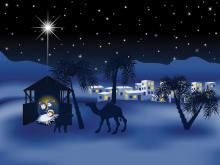
I don’t know about you, but I’m pretty sure I have sung “O Little Town of Bethlehem” every year on Christmas Eve for my entire life. But I believe this carol’s lyrics, specifically the words of the first verse, invite a little more thought than we normally give them.
O little town of Bethlehem
How still we see thee lie
Above thy deep and dreamless sleep
The silent stars go by
Yet in thy dark streets shineth
The everlasting light
The hopes and fears of all the years
Are met in Thee tonight
For now let’s ignore the historical inaccuracies of the song, and focus on what the words mean, especially the last four lines. How beautiful is it that through the dark world a light came to bind together the hopes and fears of all the years (I choose to see it as past and future) in Jesus?
WASHINGTON — As a coalition of mostly Christian groups gathered here Thursday to support church leaders who have publicly questioned U.S. aid to Israel, those same church leaders signaled that they want to reconcile with the Jewish groups who were upset by their action.
An Oct. 5 letter asking Congress to investigate U.S. aid to Israel led Jewish groups to cancel a long-planned meeting later that month of the Christian-Jewish Roundtable, a eight-year-old group dedicated to improving relations between the two faiths.
The Rev. Gradye Parsons, the top official of the Presbyterian Church (USA) and the first signatory on the letter, did not attend Thursday's Washington press conference that was convened to support its message. But Parsons said he stands by the letter, and acknowledged that it heightened tensions between Jews and Christians on the roundtable.
“We regret any distancing it put between us and our Jewish partners," he said, "and we hope we can close that gap."
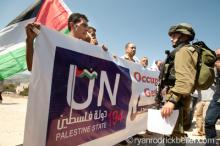
On Nov. 29, Palestinians will bid to become a “non-member observer state” in the United Nations. If approved, this would be a major step toward full statehood for Palestinians. Israel, and perhaps more important, the United States, are against this move, not least for fear of possible war-crime investigations against Israel. Israel’s rationale has always been that a final resolution cannot be achieved unilaterally, but only through direct negotiations. Ironically, Israel achieved its own independence unilaterally and through the United Nations.
Palestinian Christians leaders have sent a strong message of support for this step. A statement signed by 100 community leader says:
We believe the Palestine Liberation Organization’s initiative to enhance Palestine’s status in the United Nations to an Observer State is a positive, collective, and moral step that will get us closer to freedom. This is a step in the right direction for the cause of a just peace in the region. We fully endorse this bid, just as we supported Palestine’s application for full membership of the United Nations a year ago.
WASHINGTON — It’s an idea that feels particularly poignant this Thanksgiving: American Jews and Muslims banding together to help the homeless and other needy people.
The interfaith collaboration has been going on for five years, but the recent exchange of rockets between Gaza and Israel is weighing especially hard on both communities this week. That's why a joint session of sandwich making or a group visit to a nursing home has taken on added significance.
“In this time of warfare it was a beautiful experience to see the two come together,” said Haider Dost, a Muslim student at Virginia’s George Mason University who worked with Jewish students to feed the homeless Sunday in Franklin Park, just blocks from the White House.
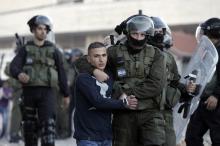
All this talk about the three Israelis killed by Gaza rockets …
What about the fifteen Palestinians killed by Israeli bombs?
If I were inclined to give mathematical value to people based on the media coverage I watched on “Fox & Friends” this morning, I would come to this conclusion:
3 Israelis > 15 Palestinians
I don’t think God sees it that way. To God, all human life is equally precious.
I saw a photo showing an Israeli holding a blood-covered, critically injured 8-month-old baby.
There’s another photo of a man, Jihad Masharawi, clutching his 11-month-old son on today’s Washington Post front page. Jihad is a Palestinian and a BBC Correspondent. He lives in Gaza. I presume he has a wife, with whom he had his son, Omar.
Omar was killed.
It is one of the great tragedies of war that the innocents on both sides suffer.
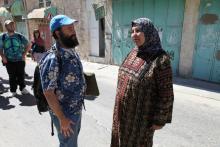
Over the past four years I have had the opportunity to spend a significant amount time in the Middle East. I no longer approach the time as a tourist, but instead seek out relationships and experiences as a listener who has much to learn about the way God is at work in contexts much different than my own. In that posture, it has been remarkable how much I have learned and begun to integrate into the way I live, love and lead back in my neighborhood. Theologian Paul Knitter describes it well when he refers to ones inherited worldview as a telescope.
"No matter how objective we may think we are or desire to be, we all see the world through a specific telescope/worldview. When we choose to look through the telescope of people who are “different” than us, we begin to get a more comprehensive picture of the world and the way God is at work within it."
Leading our first Learning Community to the Middle East apart of The Global Immersion Project I recently co-founded, I was invited to take a look through the lens of friends’ telescopes who live amid conflict in Israel and Palestine. Here are some of my key learnings:
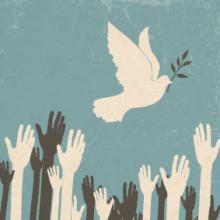
Several of my rabbi friends have explained to me that there are three Ds that we should keep in mind when we criticize the policies of the State of Israel as we work for justice and peace for Israelis and Palestinians. I think these three Ds can be helpful and can also be applied to the way that many people – including Christians and Jews – talk about Palestinians and the future Palestinian State.
The first D is Demonization. I have been told that demonization of the State of Israel occurs when it is called “a pariah nation,” compared to the Nazis, or accused of committing genocide. I agree that these references cheapen their meaning in their original context and are not helpful in pinpointing the exact policies that the State of Israel engages in that are harmful – like using tax revenue to subsidize housing for Israeli Jews in more than 120 settlements on land the Palestinians lay claim to for their future state.
The first D also applies to the ways U.S. citizens, Christians, and Jews demonize Palestinians. And just like it is never acceptable regarding Jews, Judaism, and the State of Israel, it is never acceptable regarding Palestinians, Palestinian Christians, Palestinian Muslims, Islam, and the future State of Palestine. This is most obvious in the widespread use of “terrorist” with no admission that violent extremists are a minority and that most Palestinians are hardworking people who want the best for their families and a healthy society to live in. An example of this demonization is Sacha Baron Cohen’s movie Bruno. Ayman Abu Aita, a Palestinian Christian who works for peace, was identified in the movie with the caption “Terrorist group leader.” Cohen lied to the Palestinian Christian and then for comedy purposes named him a terrorist. Abu Aita sued Cohen for defamation and they recently settled out of court.
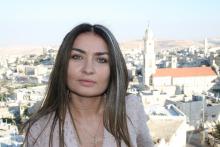
Bio: Catholic Palestinian film director and founder of the nonprofit Open Bethlehem. operationbethlehem.com
1. How did Open Bethlehem get started?
Growing up in Bethlehem, I always wanted to leave. I settled in London, but when events started becoming worse and worse in the region, I wanted to do something. So I went back and started working on a film. My cousin encouraged me and said, “Look at what’s happening to our city. Why don’t you do more than just a film?” And so together, in 2005, we started a campaign called Open Bethlehem.
2. What is its main goal?
The idea is to use Bethlehem as a doorway into the region. We created the Bethlehem Passport, which is like an honorary citizenship, inviting people to partake in the town that stands for joy and goodwill to all. The passport is an appeal to everybody to do something to help bring peace to the Middle East. We aim mostly at educating people abroad—policymakers, the media, and church leaders—about the plight of Bethlehem, its Christian community, and the diversity of the city.
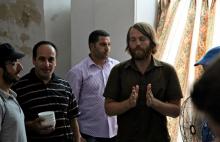
Hebron is known as one of the most volatile cities in the whole region of Israel/Palestine. Located in the heart of the West Bank, both Jews and Arabs have had roots here for thousands of years. Having endured years of conflict, racism, violence and separation, Hebron’s inhabitants have been covered in a narrative lacking an acknowledgment of a shared humanity.
It’s in the middle of such realities that our Learning Community (part of our organization, The Global Immersion Project) feels called to listen, learn, and be radically present. Through the art of friendship making, shared tables and storytelling, we desire to promote the just heart of God by being a people of reconciliation in the way of Jesus.
It was this posture that landed us in the underground home of a local Muslim Palestinian family who is close friends with the Jewish Rabbi who was hosting us in the old city of Hebron (he is both a host and dear friend). Having prepared a beautiful and expansive Palestinian meal, they warmly invited each one of us into their home and said, “Today, this is your home.”

Due to a temporary relaxation in Israeli policy, many Palestinians traveled to Jerusalem through checkpoints during Ramadan this year. But now that Ramadan is over, it’s back to business as usual.
Every day, thousands of Palestinians circumvent the Israeli separation wall by crossing into Jerusalem without permission from Israeli authorities. Israeli journalist Haggai Matar recently described this major flaw in the wall’s security rationale, even quoting a pro-barrier activist who admits:
“'There’s no problem crossing the gaps in the fence and tens of thousands of illegal workers cross it back and forth every day, and there should be no problem getting suicide bombers through with them,” stresses Ilan Tsi’on, co-founder of 'A Fence for Life.' 'So why don’t they? Because that’s the Palestinians’ choice.'”
The same logic applies to the checkpoints controlling movement within territory under Israeli occupation since 1967 — including East Jerusalem, which contains the Old City, the Haram Al-Sharif (or Temple Mount), and the Al-Aqsa Mosque. Though Israel unilaterally annexed East Jerusalem, no other nation recognizes the legitimacy of the action and international consensus still regards it as occupied Palestinian territory. That so many Palestinians routinely risk arrest and prison by circumventing these checkpoints — without incident — shows that their security rationale is absurd. While at the same time, the vast majority of Palestinians who try to play by the rules of occupation remain restricted under Israel’s matrix of control.
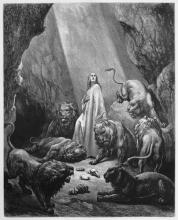
I have so often pondered what might have happened if the media had covered more honestly the stifling of protest that Nakba Day in 1999 and as a result the local officials and the world community had heard the cry? Could the disaster have passed and peace with justice been advanced.
Today the media is much more candid. One wonders if we have received a rare gift of unaltered reality in this period of deepening crisis in the Holy Land and overheated atmosphere in the American presidential campaign. For this week it is being reported clearly that we have a presidential candidate, and probably millions of likeminded uninformed voters, who are apparently oblivious or uncaring about the explosive oppression of Palestinians.
Siham Abu Awwad grew up in a Palestinian family in a small West Bank village. When Siham was 14, her mother was imprisoned for six months for demonstrating against the military occupation of the West Bank. Siham became the woman of the house, caring for her four brothers—Khaled, Youssef, Ali, and Maha.
With their mother in jail, Siham and her brothers became very close. “We had a special place in each other’s heart,” she told me. Missing her mother, and with little time for friends, Siham became especially close to Youssef. “I told him everything. He was kind and sensitive. He was like a sister!”
When Siham’s mother returned from prison, she continued her political activism and was soon arrested again, but she maintained a sense of humor and challenged her children to be kind and good.
The establishment of a nearby Jewish settlement led to ongoing seizures of land from Siham’s village, and there were frequent protests. By the time Siham was 17, her mother and all her brothers had been in and out of jail for participating in the protests that are illegal under Israeli law. Knowing she would likely be imprisoned again and concerned for her daughter’s future, Siham’s mother encouraged her to marry. Siham did, and eventually gave birth to five children.
Youssef and Ali both married too, but happiness was short-lived. Two months after his wedding, Ali was shot in the leg by a settler. Doctors wanted to amputate his leg and feared he would not survive, but his mother arranged treatment in Saudi Arabia, where Ali’s life and his leg were saved. While preparing a celebration for Ali’s return, Youssef was shot and killed by an Israeli soldier at a checkpoint. “Youssef was our angel,” said Siham, “always with a smile.”
 Earlier this month, I boarded a train with my brother-in-law and headed to Chicago to protest the 2012 NATO Summit. If you are asking "why protest?" you can find a substantial list here.
Earlier this month, I boarded a train with my brother-in-law and headed to Chicago to protest the 2012 NATO Summit. If you are asking "why protest?" you can find a substantial list here.
Security had been ramped up and no food or liquids were allowed on the train. We met some fellow protesters during the trip and when we arrived at Union Station we hustled to make it to Grant Park on time. In transit to the park the sun was already warming our necks and I found myself reaching for the small tube of sunblock that I had stashed in my pocket.
We arrived in plenty of time to catch the pre-march rally at Petrillo Bandshell. Many stories were shared by fellow activists from around the world. The air was humid, yet vibrating with the passion of thousands as we prepared to march together for peace.
Amidst a swirl of percussion the crowd was chanting: "We are unstoppable! Another world is possible!"